Viewing Log #62: Indivisible has a lot of "I"s [11/29/10 - 12/7/10]
by Ryland Walker Knight
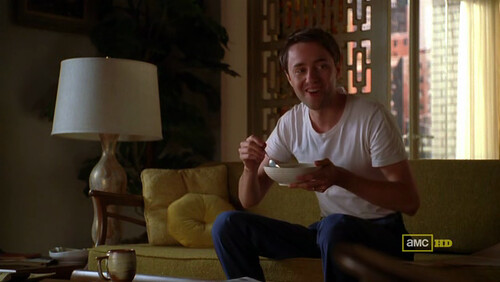
—Though I did watch Broken Embraces again with Martha (ahem), and Prisoner of Azkaban again with Haz, I didn't watch much else last week besides the third season of Mad Men. So that's all I'm going to talk about here.
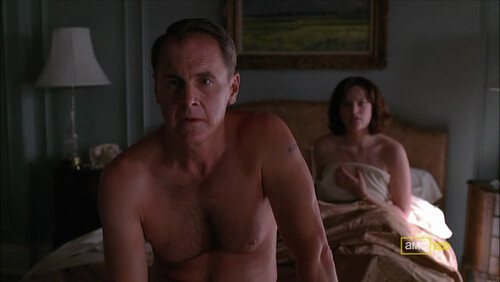
On my first night in Brooklyn last week, after an unexpected and unwelcome tour of the west side, I went to dinner with some friends. Talk turned to movies and TV, as should be expected with this crowd, and I brought up my recent plunge into Mad Men in part because I watched an episode on the flight and in part because I wanted to talk to one of these four people in particular about my reactions and assessments so far. Unfortunately, we two were the only people familiar with the show and the talk was short. Fortunately, it afforded us a private set of words to gush with: when I said, "What about that dance Pete and Trudy do at Roger's wedding?" we both lit up and shook our heads with delight. And we both agreed, out loud, turning to our friends, that it's one of the rare shows that gets markedly better as it goes along.
This is not a result of simple familiarity. Sure, we know these characters more/better by the time this third season gets started. But there's a tone, a dynamic between expectation and action, that sets this set of thirteen apart. The biggest factor is the show's sense of humor. The ridiculous is an easy target but when you mix horror into that you get a messier laughter. Disbelief is a basic reaction to absurdity and laughter's an easy way to paper over uncomfortable social interactions but I don't think that's the only thing that motivates the jokes and laughs in this show. (And yet, what else can you do but throw up your hands and laugh when somebody beautiful and smarmy gets his foot cut off and his foot blood sprays across a crowd of slack-jawed drunks?) I'm fairly certain there's some poking fun at certain characters going on in some of the jokes—and it's mostly these men the show makes fun of; you see Pete, above, eating cereal and watching cartoons while Trudy's gone—but there's also a dry wit and there's also a righteous "aha!" every now and again, like when Joan smashes that vase on her self-pitying dolt of a gorgeous husband.
Put another way: for all the damage done, this season was fun. Especially the finale. (Save, of course, that late-night scene when drunk Don calls Betty "a whore" and means it.) If this show's really about television as advertising—that is, how television's medium advertises fantasies and sets up expectations of a world you want to join—the same way The Sopranos is about television as therapy—as a perfect arena to get advice on how not to live—then this season finale did the best job selling me my American dream: to build something successful of my own, using talents I'm proud of, in a world beset by vultures.
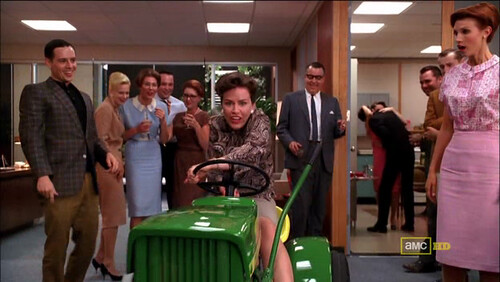
Yet it's also telling that one success is met with another failure, as happens with Don's home, though that nuclear dissolution could hardly be a surprise to anybody with a brain. The show remains replete with tidy plot points. The surprises aren't the arcs, though Duck's new role in Peggy's life is a wrinkle I didn't expect until "Seven Twenty Three" (3x7) started with all those "awakenings" (again, the bluntness!). This is the most curious aspect of Weiner's world, I'm finding: one step forward is always meted by another step back. It's hard to say who's ever getting ahead—to the point that you think that isn't the point here. Then again, when "happiness" is the point, and when the show's selling us a world where happiness is a fantasy or at least fleeting, getting ahead may only be as simple as dealing with unhappiness better than the next guy or gal. And maybe that's the American they're selling so well at this moment: we deal with things, sometimes better than other times, and we find ways to live. Living, here, isn't just meeting an image of yourself or what's expected of that image (ie, buying something or fucking somebody); living is balancing on your own two feet in the role you've chosen.
A different friend said, "Don wants his children to be children," when I said, "This Grandpa character's a trip." And I think he was correct. Don wants everybody to fall in line, really. It'd read more autocratic and asshole if it weren't tempered by the love he so clearly holds for every single person he has a relationship with, even that senile Grandpa; however, lies rot bonds and/or lies sever ties. Proof positive that love is never enough, and money certainly is not. When Ruby shoots Oswald on live television and Don tells Sally that "nothing" happened, Sally knows it's a lie. It's those lies than doom Don. Because it's admirable in some ways to want your children to be children and nothing else but it's ignorant to ignore (look at the root!) your daughter's burgeoning brain powers. One can hope Don learned this when he groveled for Peggy, in a truly affecting scene thanks to some wet eyes and smart dialog, but I'm not holding my breath. In fact, I'd be surprised if Sally and Bobby and Lil Gene are anywhere near as big a part of Season Four as they were in Three. (Am I wrong? Don't tell me?) At any rate, the kids are hardly as interesting as their mother.
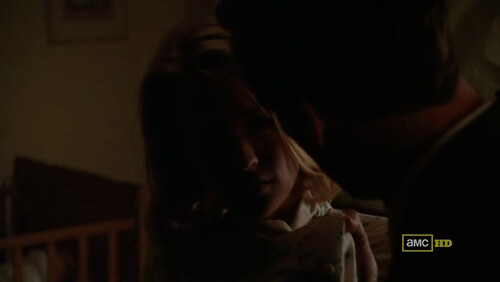
Betty Draper, soon to be Betty Francis I suppose, is probably the most interesting character of all. But I am forever at a loss at how to articulate why since I'm just so damned involved in finding out what she'll do next in her myopia-mirrored-mired life. Makes me think another shoe will drop soon. For all of Don's lies, he's pretty dependable. Betty, on the other hand, seems stuck inside her competing emotions, playing a role she doesn't know the stage directions for, counting all her chickens before they hatch (which last season made literal, which continued this season with her dad's arrival). So I'm quick to hold back judgment. And I'll withhold it yet longer still because Betty's mostly a child and the charitable person would have you believe children can learn things, like how to grow up, as they attempt to rudder their pursuits of happiness.
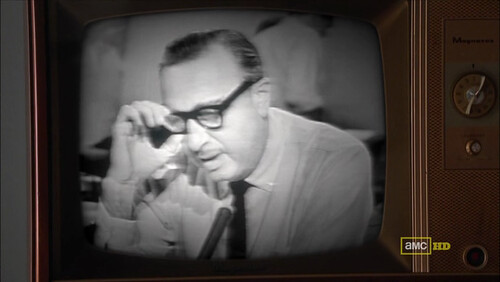
After all, we are a young country.




Love everything about this post, esp. the title & closing line. Right on.
ReplyDeleteJust finished the fourth season. First and third are the best, I think; the most in the mode of events, American examination & specifics/less mired in the sorta stagnant, but necessary, emotional drama.
Thanks, Ken. The first season wasn't funny enough but it was still pretty good television; it got me on to the second season, after all. Hard to imagine the fourth season getting much better than this one, but I trust it'll be goofy and SCDP will run up against some problems that might make for good jokes and/or heartache. Lord knows how Betty will adapt. I'm guessing, though, that she'll go full monster, which might make her less intriguing.
ReplyDeleteAlso: don't you think you should be angling to be cast as some young turk in the next season??! Somebody gunning for Pete's job, maybe?
I won't spoil anything.
ReplyDeleteOh, hell yes! I'd love that. My eyes are open; ready for production to start.